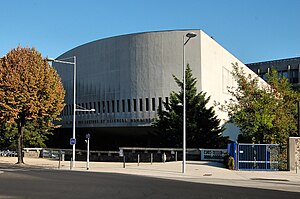
Blaise Pascal
Physicist, Author
1623 – 1662
Who was Blaise Pascal?
Blaise Pascal was a French mathematician, physicist, inventor, writer and Christian philosopher. He was a child prodigy who was educated by his father, a tax collector in Rouen. Pascal's earliest work was in the natural and applied sciences where he made important contributions to the study of fluids, and clarified the concepts of pressure and vacuum by generalizing the work of Evangelista Torricelli. Pascal also wrote in defense of the scientific method.
In 1642, while still a teenager, he started some pioneering work on calculating machines. After three years of effort and fifty prototypes, he invented the mechanical calculator. He built 20 of these machines in the following ten years. Pascal was an important mathematician, helping create two major new areas of research: he wrote a significant treatise on the subject of projective geometry at the age of 16, and later corresponded with Pierre de Fermat on probability theory, strongly influencing the development of modern economics and social science. Following Galileo and Torricelli, in 1646 he refuted Aristotle's followers who insisted that nature abhors a vacuum. Pascal's results caused many disputes before being accepted.
Famous Quotes:
- Je n’ai fait celle-ci plus longue que parceque je n’ai pas eu le loisir de la faire plus courte.
- Nothing gives rest but the sincere search for truth.
- The eternal silence of these infinite spaces fills me with dread.
- Man is only a reed, the weakest in nature; but he is a thinking reed. There is no need for the whole universe to take up arms to crush him: a vapor, a drop of water is enough to kill him. But even if the universe were to crush him, man would still be nobler than his slayer, because he knows that he is dying and the advantage the universe has over him. The universe knows nothing of this.
- If we examine our thoughts, we shall find them always occupied with the past and the future.
- Man's greatness lies in his power of thought.
- If all men knew what each said of the other, there would not be four friends in the world.
- Evil is easy, and has infinite forms.
- There are only three types of people; those who have found God and serve him; those who have not found God and seek him, and those who live not seeking, or finding him. The first are rational and happy; the second unhappy and rational, and the third foolish and unhappy.
- If we let ourselves believe that man began with divine grace, that he forfeited this by sin, and that he can be redeemed only by divine grace through the crucified Christ, then we shall find peace of mind never granted to philosophers. He who cannot believe is cursed, for he reveals by his unbelief that God has not chosen to give him grace.
We need you!
Help us build the largest biographies collection on the web!
- Born
- Jun 19, 1623
Clermont-Ferrand - Parents
- Siblings
- Religion
- Catholicism
- Ethnicity
- French people
- Nationality
- France
- Profession
- Died
- Aug 19, 1662
Paris
Submitted
on July 23, 2013
Citation
Use the citation below to add to a bibliography:
Style:MLAChicagoAPA
"Blaise Pascal." Biographies.net. STANDS4 LLC, 2024. Web. 25 Apr. 2024. <https://www.biographies.net/people/en/blaise_pascal>.

Discuss this Blaise Pascal biography with the community:
Report Comment
We're doing our best to make sure our content is useful, accurate and safe.
If by any chance you spot an inappropriate comment while navigating through our website please use this form to let us know, and we'll take care of it shortly.
Attachment
You need to be logged in to favorite.
Log In